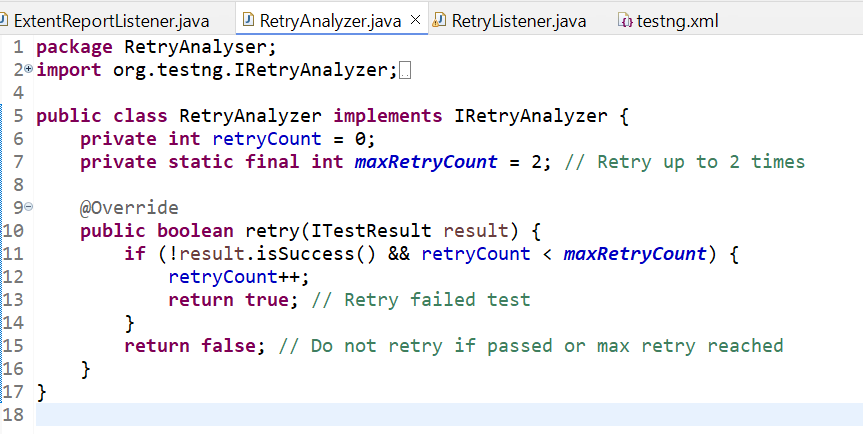How to Use RetryAnalyzer in TestNG to Re-run Failed Tests
- Sumathi Mukkera
- Mar 20, 2025
- 2 min read
In test automation, sometimes tests fail due to transient issues like network instability or temporary unavailability of resources. TestNG provides a handy feature called RetryAnalyzer, which allows you to automatically re-run failed tests a specified number of times before marking them as failed. This can help make your test suite more robust and reliable by reducing the impact of occasional failures.
In this blog post, we'll explore how to use RetryAnalyzer in TestNG and configure it to run automatically through listeners defined in testng.xml.
What is RetryAnalyzer?
RetryAnalyzer is an interface in TestNG that allows you to define the logic for retrying failed tests. By implementing this interface, you can configure the number of retry attempts for a test before it is considered as failed.
How to Implement RetryAnalyzer?
To use the RetryAnalyzer in your TestNG framework, you need to create a custom class that implements the IRetryAnalyzer interface.
Let’s go through the steps of implementing and using the RetryAnalyzer in your tests.
Step 1: Create the RetryAnalyzer Class
Create a class called RetryAnalyzer that implements the IRetryAnalyzer interface:

Step 2: Create the RetryListener Class
RetryListener class implements the IAnnotationTransformer interface, which will automatically apply the RetryAnalyzer to all the test methods.

Step 3: Register RetryListener in testng.xml
Now, need to tell TestNG to use the RetryListener. This is done by adding the listener to testng.xml file.

Step 4: Running the Tests
1. Right-click on testng.xml in your Eclipse project.
2. Select Run As > TestNG Suite.

TestNG will automatically apply the RetryAnalyzer to all test methods, and failed tests will be retried based on the logic defined in RetryAnalyzer.
Conclusion
Using IAnnotationTransformer and RetryListener, you can dynamically apply the RetryAnalyzer to all your tests without having to modify each individual test method with retryAnalyzer annotations. This makes it easy to apply retry logic globally across your test suite.

